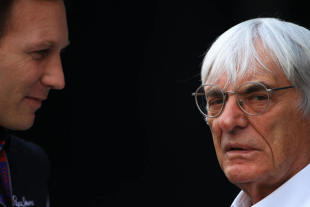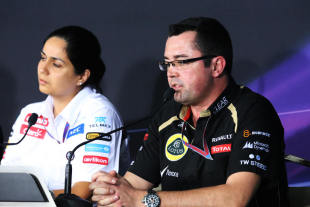- News
Teams unite behind budget cap proposal
Chris Medland October 28, 2012 « Di Resta perplexed by car problem | French Grand Prix could join 2013 calendar »
- Drivers:
- Eric Boullier
- |
- Ross Brawn
- |
- Bernie Ecclestone
- |
- Monisha Kaltenborn
- Teams:
- Alfa Romeo
- |
- Lotus F1
- |
- Mercedes
Formula One's teams have stated their support for a new budget cap proposal from Bernie Ecclestone.
Ecclestone has been keen on a budget cap for some time, and has told the teams he is willing to set the initial limit as high as $250million. While such a figure would not immediately affect many teams on the grid, the general consensus in the paddock is that any form of imposed cap - regardless of limit - would represent a good starting point for future progress.
On Sunday morning, Ecclestone confirmed his hope was still to use a budget cap to attract new teams to the sport.
"We're looking at the right way to put [a budget cap] in," Ecclestone said. "What we're trying to do is reduce the necessity to spend money to be competitive so somebody can come in to a sensible budget and be competitive, not have to spend a fortune. I am talking about [$250m], maximum spend on everything in Formula One … not marketing, but drivers salaries, whatever."
Lotus team principal Eric Boullier told ESPNF1 that the suggested figure would be more about "the principle" and would help teams understand what needs to be done to make a more strict cap work.
"I don't know if it's realistic or not obviously because most of the teams on the grid don't have this budget," Boullier said. "But I think it's a good starting point to ensure we speak about proper cost saving in a way that we can work on this. Obviously it's not the final aim, but it's clearly a starting point to have everybody starting to understand the needs to have a reasonable cost. Of course [it won't affect most of the teams at $250m] but it's more the principle rather than the fact about the amount of money."
For Monisha Kaltenborn, however radical the amount she feels it will prove that teams don't need an unlimited budget.
"I think that the importance of the talk is that we all agree and consider very specifically such a concept," Kaltenborn told ESPNF1. "Because we had the discussion before and that was in a way also an extreme figure which was very low at that time from [ex-FIA president] Max [Mosley], but it triggered the discussion.

"I think we have seen with the RRA (Resource Restriction Agreement) where we limited certain areas that we took a step in the right direction. I think you have to be careful saying is it about cost cutting or is it also about maybe not having the need to spend that much."
Kaltenborn agrees with Boullier that the figure would come down over time, but that such a high initial threshold would help get all teams on board.
"For us we have said for quite a while that a budget cap is the best route forward, and of course when you start something like this you have to be at a level where you have some realistic chance that everybody is going to be for it. Now, whatever that level is going to be, definitely for most of the teams it is still a very high level and for some it will involve a little bit of a cut. But the idea is then to bring it further down - which we have also picked up again and support - that will then come down finally to a level that allows all teams to take part in it, otherwise the change will again be too radical for some teams and they might not participate in the concept."
Ecclestone's idea also has the backing of manufacturers, with Mercedes team principal Ross Brawn keen to see it introduced as long as it allows technical freedom.
"I think we have to find a way of controlling how much money a team's allowed to spend," Brawn said. "Once you have that methodology in place you can screw it right down. You can start at £100m, you can go to £80m, you can go to £60m, you can go to £40m; you can screw it right down as long as the methodology and control is in place.
"At the moment we don't have that control. We do a technical change in the hope that it will save some costs but then we find we spend a bit more money on something else we can get our performance back. So it just goes round in a circle, I know it's been described as squeezing a sausage - you squeeze one bit and it just expands somewhere else - and I think that is the case. We're completely behind and completely support the idea of controlling costs and allowing the cleverest engineers and the cleverest drivers within X amount of money to show how good they are.
"Once that's done then as I say we can start to push it down. But you can't push it down when there's not a satisfactory system in place."
"We're looking at the right way to put it in … what we're trying to do is reduce the necessity to spend money to be competitive so somebody can come in to a sensible budget and be competitive, not have to spend a fortune. I am talking about [$250m], maximum spend on everything in Formula One … not marketing, but drivers salaries, whatever."
Chris Medland is assistant editor at ESPNF1
© ESPN Sports Media Ltd.
 Chris Medland is assistant editor at ESPNF1 Chris Medland, who in his youth even found the Pacific GPs entertaining, talked his way in to work at the British Grand Prix and was somehow retained for three years. He also worked on the BBC's F1 output prior to becoming assistant editor ahead of the 2011 season
Chris Medland is assistant editor at ESPNF1 Chris Medland, who in his youth even found the Pacific GPs entertaining, talked his way in to work at the British Grand Prix and was somehow retained for three years. He also worked on the BBC's F1 output prior to becoming assistant editor ahead of the 2011 season

